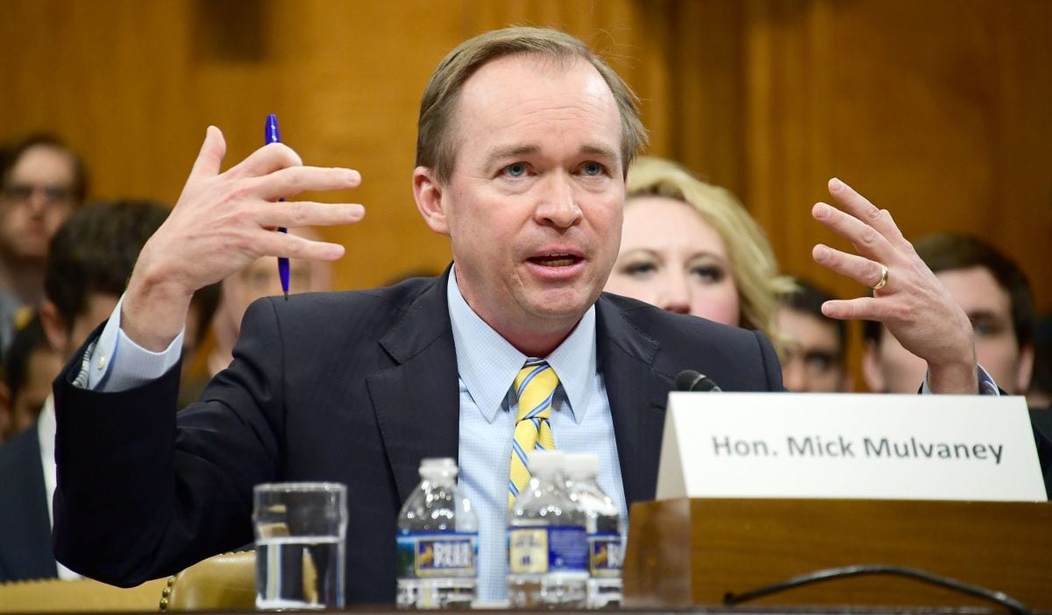Mick Mulvaney, former member of Congress who now heads up the Consumer Financial Protection Bureau (CFPB), just forced an epidemic of fainting in our nation’s capital.
CFPB, an independent agency, does not receive its funding from Congress, but from the Federal Reserve. Every quarter, the agency is supposed to request operating funds from the Fed. Last quarter, the former director, Richard Cordray, an Obama appointee, asked for $271 million. The previous quarter, Director Cordray requested $86 million.
Yesterday, Mulvaney sent his first budget request to the Fed. Let’s just say that a lot of smelling salts were needed to revive official Washington.
He requested zero.
In a letter to Fed Chair Janet Yellen obtained by POLITICO, Mulvaney wrote that the bureau has $177 million in the bank, enough to cover the $145 million the bureau has budgeted for its second quarter. Cordray had maintained a “reserve fund” in case of overruns or emergencies, but Mulvaney said he didn’t see any reason for it, since the Fed has always given the bureau the money it needs. Mulvaney, who is also Trump’s budget director, noted that instead of advancing the funds to the bureau, the Fed could return them to the Treasury and reduce the deficit.
“While this approximately $145 million may not make much of a dent in the deficit, the men and women at the Bureau are proud to do their part to be responsible stewards of taxpayer dollars,” Mulvaney wrote.
Common sense versus the bureaucratic mind. Just what “emergencies” would the CFPB have to face? And we wonder why we’re running half a trillion dollar deficits.
When was the last time we actually heard the phrase “responsible stewards of taxpayer dollars” from someone not running for re-election?
The Trump administration has not shown much interest lately in deficit reduction, but it has shown avid interest in reining in the independent CFPB. As a member of Congress, Mulvaney (R-S.C.) routinely denounced it as an overzealous regulator, and on his first day at the bureau after replacing Cordray in November, he trashed his new workplace as “an awful example of a bureaucracy gone wrong.” And even as Cordray’s former deputy, Leandra English, has fought Mulvaney’s appointment in court, he has moved swiftly to shake up its culture.
Earlier this week, he announced the bureau would reconsider its new rules designed to protect consumers from payday-lending debt traps, and Wednesday, he launched a formal review of how the bureau demands information from firms it investigates. He has even revamped the agency’s mission statement; the new wording suggests that its first priority should be “identifying and addressing outdated, unnecessary, or unduly burdensome regulations.”
The CFPB was designed to protect consumers from their own ignorance and stupidity. If a potential home buyer doesn’t bother to read and understand the conditions of the loan and is then surprised when his mortgage payments balloon, is it the responsibility of government to then arrest the mortgage official for his client’s own failures? The same is true for pay day loan companies. Everything a borrower needs to know is right there on the loan application. They aren’t trying to put the consumer in a “debt trap.” The consumer does it himself due to a failure to understand what he is signing.
The myth that arose during the housing crisis was that unscrupulous brokers and companies tricked millions of people into signing mortgage agreements that could go south in a hurry if there was a downturn. The facts are different. While there were no doubt a few villains who hoodwinked consumers, the overwhelming majority of people whose mortgages went underwater got that way for a variety of reasons, not least of which was that they bought too much house. When homes were appreciating at 10% per year, they could get away with it. But when it all crashed, who was to blame?
The Obama administration created the CFPB to protect people from their own indifference. Mulvaney is my new hero, recognizing the utter uselessness of the agency he heads while looking to wind down its regulatory overreach.










Join the conversation as a VIP Member